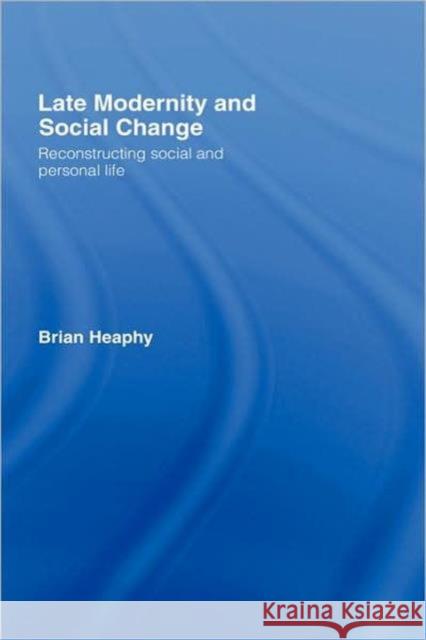Late Modernity and Social Change: Reconstructing Social and Personal Life » książka
Late Modernity and Social Change: Reconstructing Social and Personal Life
ISBN-13: 9780415281768 / Angielski / Twarda / 2007 / 200 str.
Late Modernity and Social Change: Reconstructing Social and Personal Life
ISBN-13: 9780415281768 / Angielski / Twarda / 2007 / 200 str.
(netto: 718,58 VAT: 5%)
Najniższa cena z 30 dni: 654,86
ok. 16-18 dni roboczych.
Darmowa dostawa!
Sometimes social theory can seem dry and intimidating - as if it is something completely apart from everyday life. But in this incisive new text, Brian Heaphy show exactly how the arguments of the great contemporary theorists play out against extended examples from real life. Introducing the ideas of founding social thinkers including Marx, Durkheim, Weber, Simmel and Freud, and the work of key contemporary theorists, among them Lacan, Foucault, Lyotrad, Baudrillard, Bauman, Giddens and Beck, the book begins by examining the merits of the 'late modernity' thesis against those of the proponents of 'post-modernity'. The authors show the wide swoop of influence of 'post-modern' thought and how it has changed the way even its opponents think. It also discusses feminist, queer and post-colonial ideas about studying modern and post-modern experience. With examples from personal life (including self and identity, relational and intimate life, death, dying and life-politics) to bring theory to life, this clear and concise new text on contemporary social theory and social change is ideal for students of sociology, cultural studies and social theory.
Sometimes social theory can seem dry and intimidating – as if it is something completely apart from everyday life. But in this incisive new text, Brian Heaphy show exactly how the arguments of the great contemporary theorists play out against extended examples from real life.
Introducing the ideas of founding social thinkers including Marx, Durkheim, Weber, Simmel and Freud, and the work of key contemporary theorists, among them Lacan, Foucault, Lyotrad, Baudrillard, Bauman, Giddens and Beck, the book begins by examining the merits of the 'late modernity' thesis against those of the proponents of 'post-modernity'. The authors show the wide swoop of influence of 'post-modern' thought and how it has changed the way even its opponents think. It also discusses feminist, queer and post-colonial ideas about studying modern and post-modern experience.
With examples from personal life (including self and identity, relational and intimate life, death, dying and life-politics) to bring theory to life, this clear and concise new text on contemporary social theory and social change is ideal for students of sociology, cultural studies and social theory.











